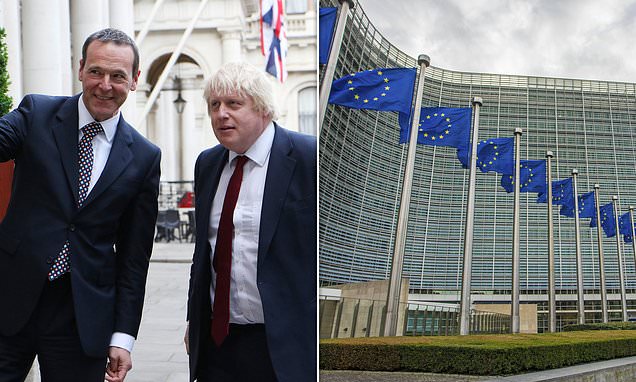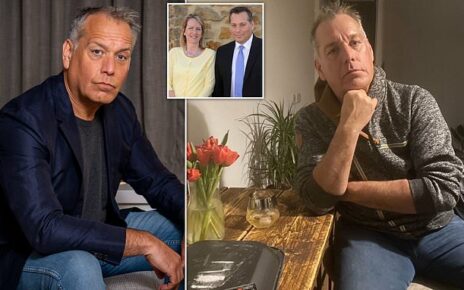Lord VENGEFUL: Besotted by Brussels, called supercilious by ministers, GUY ADAMS investigates the Foreign Office mandarin who’s put the final nail in the coffin of Civil Service neutrality
Simon McDonald, properly known as Lord McDonald of Salford, is a 62-year-old former diplomat who spent almost four decades climbing greasy poles, eventually reaching the hallowed status of Permanent Under-Secretary at Her Majesty’s Foreign Office, which he ran from 2015 to 2020.
Throughout his long and distinguished career, the often-bespectacled mandarin was bound like all civil servants by the Civil Service Code, a cornerstone of Britain’s modern democracy.
The document underpins the delicate relationship between elected politicians and unelected Whitehall officials, requiring the latter to eschew bias and always ‘serve the Government, whatever its political persuasion, to the best of your ability’.
It specifically forbids civil servants from seeking to ‘frustrate the implementation of policies’ that have been endorsed by their political masters, and states that they must always act with scrupulous neutrality and never ‘allow personal political views to determine any advice you give, or your actions’.
All of which explains the hoo-hah over a TV interview Lord McDonald gave this week, in which the BBC’s Laura Kuenssberg, in a documentary about the aftermath of the 2016 Brexit referendum, asked how staff under his command had reacted to the result.

Simon McDonald (left), properly known as Lord McDonald of Salford, is a 62-year-old former diplomat who spent almost four decades climbing greasy poles, eventually reaching the hallowed status of Permanent Under-Secretary at Her Majesty’s Foreign Office, which he ran from 2015 to 2020
‘The main feeling in the Foreign Office building was of mourning,’ he said of the morning after the vote. ‘People were in tears. People were in shock.’
McDonald then revealed that, in an apparent effort to comfort the grief-stricken Remainers, he’d decided to give an impromptu speech boasting that he, too, had voted against leaving the EU.
‘On this occasion, this solitary occasion, I decided to tell my colleagues and therefore let ministers know that I voted to remain in the European Union,’ he said.
‘I felt that they would assume that in any case. So I decided to embrace it.
‘I was trying to maintain credibility and trying to convey a message to a group of people, most of whom I felt had voted to remain in the EU, that their personal feelings were beside the professional point.’
In other words, it would appear that just hours after the Brexit referendum, the man running the Foreign Office decided to allow ‘personal political views’ to determine his actions.
‘It was a personal decision,’ he added. ‘My board were not entirely comfortable and all these years later you can have a conversation about [whether it was] the right decision.’
Indeed you can. For McDonald’s admission — of what many regarded as a clear breach of Civil Service neutrality — is fascinating in light of the opprobrium that’s been heaped on those who have dared to suggest that Whitehall’s workforce might be vaguely biased against Brexit.
Only last year, the Home Secretary Suella Braverman, for example, was roundly carpeted for daring to suggest, in a newspaper interview, that some civil servants might have a ‘Remain bias’.
The Twitterati immediately reached for the smelling salts.
No lesser a pooh-bah than Sir Jonathan Jones, the former head of the Government Legal Department, promptly hit the airwaves to criticise what he called her ‘generalised unsubstantiated criticisms’.

Simon McDonald then revealed that, in an apparent effort to comfort the grief-stricken Remainers, he’d decided to give an impromptu speech boasting that he, too, had voted against leaving the EU
Union boss Dave Penman, of the FDA, accused Braverman of ‘attacking civil servants for doing their job, knowing that they’re not even allowed to defend themselves’. Yet despite this confected outrage, the Home Secretary appears to have been on the money. What’s more, an extended look at the life and times of McDonald, whose claims to fame include amassing the Civil Service’s biggest ever pension pot (some £2.2 million at the last count), offers a highly informative insight into the vexed question of whether elected politicians — or unelected officials — now run Britain.
A grammar school boy from Manchester, who married into Whitehall aristocracy (his wife Olivia’s father Patrick, Lord Wright of Richmond, also ran the Foreign Office), he joined the Civil Service straight out of Cambridge in the early 1980s.
For the next 20 years, he juggled postings to Saudi Arabia, West Germany and Washington with stints back home in London, before gaining his first ambassadorship, to Israel, in 2003.
He returned to London around the time Gordon Brown entered Downing Street to serve as his Foreign Policy adviser, one of a trio of senior civil servants, including the late Jeremy Heywood and the Treasury’s Jon Cunliffe, who called themselves the ‘Three Amigos’ and controlled many of No 10’s levers of power.
By then, McDonald had fathered four children (now grown up) and was commuting to Westminster from his imposing home a stone’s throw from Winchester Cathedral.
He and Olivia still own the pile, on a private road where properties now change hands for upwards of £3 million, despite the fact that he now divides most of his working time between Cambridge University, where like many power brokers of the Blair era he now runs a college (Pembroke), and the House of Lords.
Today, Cambridge University maintains controversial ties to China. Whether that partly explains a second odd interview McDonald gave this week — telling the Today programme that MPs had overreacted to the recent arrest of an alleged Chinese spy in Westminster, and saying the Communist dictatorship had a ‘legitimate objective’ in finding out what goes on in Parliament — is anyone’s guess.
From 2010-2015, McDonald ran the UK’s embassy in Germany. His final Civil Service job placed him in overall charge of not only the Foreign Office but also the wider diplomatic service. It is, all told, a glittering CV. But his rise wasn’t entirely without friction. Just as McDonald was cutting his teeth, Yes Minister was a staple of the TV schedules and, according to many of the politicians who later crossed his path, he fitted the programme’s Sir Humphrey stereotype of a Whitehall mandarin pulling the strings of elected politicians.
Take, for example, various incidents chronicled in the diaries of Sir Alan Duncan, the Tory MP who became a junior minister in McDonald’s Foreign Office in 2016.

From 2010-2015, McDonald ran the UK’s embassy in Germany (File photo: The British embassy in Berlin)
Friction between them began almost straight away, with Duncan expressing annoyance at the civil servant seeking to sideline him during a visit by then-Prime Minister Theresa May to their building.
‘McDonald hogs the PM during her visit, meeting her at the entrance, chairing the meeting while I am made to sit at the back,’ he wrote. ‘It is clear who he thinks is the most important person in the Foreign Office.’
A few months later, Duncan remarked: ‘I just don’t know what he [McDonald] does all day. I find him so supercilious.’
In 2019, the Minister and his Civil Service grandee became involved in a remarkably petty dispute in which McDonald refused a request by Duncan — who, remember, was an elected politician — to standardise the email sign-offs used by Foreign Office staff.
‘Throughout the FCO there is no consistency in the style and composition of the embedded signature template that pops up at the end of anyone’s email,’ Duncan wrote. ‘The phone numbers are randomly typeset, the job descriptions are arbitrary, and some have slogans or messages added such as “Support the FCO in its work for diversity”. Ugh!’ Duncan added: ‘There is a correct format for expressing UK and mobile phone numbers and I am insisting that nothing that is incorrect should be tolerated. I want everyone to be told to adopt a simple FCO house style.
‘It’s so simple, but McDonald says that such an instruction would be thought offensive. Offensive!!?!? He is there to tell people what to do and maintain standards. His management standards leave a lot to be desired. You simply would not believe the resistance he puts up to a simple instruction.’
Though frivolous in nature, the failure of McDonald to accede to a minister’s perfectly reasonable request sits at best awkwardly with the Civil Service Code’s prohibition of anything that might ‘frustrate’ an elected politician’s policies.
The then Foreign Secretary, Boris Johnson, would doubtless agree. Early during his stint as Foreign Secretary under Theresa May, the BBC filmed a documentary called Inside The Foreign Office. Its unflattering portrayal of Boris —filmed falling asleep on diplomatic flights — was in stark contrast to the urbane presentation of McDonald, who told viewers: ‘Diplomacy is the art of letting other people have your way.’
‘Typically, for Simon, he managed to make most of the film about him,’ is how one colleague undiplomatically puts it.

Early during his stint as Foreign Secretary under Theresa May, the BBC filmed a documentary called Inside The Foreign Office (File photo: Simon McDonald in a promotional photo for the BBC’s Inside The Foreign Office)
In short order Boris came to believe that Remain-supporting McDonald was deliberately undermining Brexit negotiations.
‘Simon McDonald and his senior officials regarded Boris as an intellectual vandal for destroying their Eurocentric statecraft,’ reads Tom Bower’s semi-authorised biography of Johnson. ‘Encouraged by Tony Blair and other Remainers, they now hoped that the weak minority government could not prevent Brexit being reversed.
‘If the EU could be spurred to reform itself, the reasons for Brexit would be undermined.’
McDonald disputes Bower’s analysis. However after Johnson entered Downing Street, the relationship deteriorated further.
By early 2020, it was being reported that the career diplomat was on a ‘No 10 s*** list’ of civil servants it wanted to be replaced for allegedly opposing Tory policy, in particular with perceived hostility to leaving the EU.
The former PM and his adviser Dominic Cummings were convinced he was part of the Civil Service ‘Blob’ trying to frustrate the will of the public.
‘Boris thought Simon and others were constantly trying to undermine him by leaking stories about him being lazy and so on,’ a Whitehall source later recalled. ‘It was a very difficult working environment because the civil servants never forgave Boris for Brexit.’
Senior Tories were also becoming angered by what they saw as McDonald’s devotion to virtue signalling. During his reign, the ministry signed up to various programmes endorsed by Stonewall, the charity whose stance on trans issues has caused huge controversy, and used Twitter to post endless messages about the Foreign Office’s commitment to ‘diversity’ and the ‘Pride’ movement, boasting regularly about the recruitment of female, black, Asian and minority ethnic recruits, and disabled staff.
‘I was delighted to appoint Joanna Roper as the FCO’s Special Envoy for Gender Equality,’ read one typical message. ‘I have resolved to place gender equality at the heart of all we do.’
In the heat of the culture wars, this only added to the impression that the Civil Service was prioritising its own — rather than the elected Government’s — agenda.

Simon McDonald (pictured) was eventually decapitated later that year, when the Government merged the Department for International Development with the Foreign Office
‘Simon combined a slippery personality with a grating, woke management style, constantly self-promoting and constantly travelling so he could post some picture of himself standing with a rainbow flag in an exotic British embassy,’ says a senior Foreign Office insider who crossed paths with him around this time. ‘He was constantly on the road, and I often wondered how he could effectively run a department when he was sitting in Timbuktu or wherever.
‘He also consistently failed to exert his authority to increase standards. When you are running a department there are times when you need to tell someone what to do, but he just protected mediocrity.’
McDonald was eventually decapitated later that year, when the Government merged the Department for International Development with the Foreign Office. ‘By then, Downing Street had completely lost faith in him and wanted a new PPS in charge,’ recalls another former insider.
‘McDonald was coming up to retirement, and thought it would be a kinder legacy for him to be allowed to do another six months and complete the merger before he left, but Boris was adamant that he wanted him out.
‘Although they softened the blow with a Peerage, that coloured everything and since being booted out he has dedicated an extraordinary amount of time and energy to exacting revenge. He rarely says no to an interview request, especially from the BBC . . . ’
In the aftermath of his forced retirement, McDonald devoted himself to writing a memoir entitled Leadership: Lessons From A Life In Diplomacy’.
It largely sank without trace save for an undignified row which broke out when it emerged that the hardback edition named the son of a former Tory Cabinet minister as an MI6 spy.
Apologies were issued, and the spy’s name was removed from a paperback edition of the book, though not before this stickler for protocol’s indiscretion had become the talk of the diplomatic world.
‘I and former colleagues of Lord McDonald were shocked and stunned that he named names in the way he chose to do. It was a reckless — and, frankly, hurtful — thing to do,’ a former senior ambassador said this week.
‘The FCO is like a family: family rows are best settled in private. Simon McDonald should have known better. His judgment (a key quality required of our overseas representatives) clearly deserted him. Sadly that means that his reputation has taken quite a blow. He must know that.’

Earlier this year, he contributed to the demise of his former Foreign Secretary, Dominic Raab, giving a series of interviews supporting complaints that the politician had bullied civil servants
Elsewhere, McDonald has played a key role in the demise of not one but two of his former political masters. Last year, he wrote a sensational public letter to Kathryn Stone, the Parliamentary Commissioner for Standards, after junior Foreign Office minister Chris Pincher had drunkenly propositioned various young men at the Carlton Club on Pall Mall.
At the time, Boris Johnson’s Downing Street press team were vigorously denying that the PM had ever been made aware of prior complaints about Pincher’s conduct. McDonald insisted that Johnson had in fact been personally briefed about them.
Though some insiders still dispute this version of events, his intervention swiftly led to Boris’s resignation. On the evening he went, McDonald posted an image of Parliament to Twitter with the caption: ‘It was a good day.’
Earlier this year, he contributed to the demise of his former Foreign Secretary, Dominic Raab, giving a series of interviews supporting complaints that the politician had bullied civil servants.
A formal inquiry later concluded that he was ‘intimidating’ and ‘aggressive’ towards officials and upheld two of eight complaints.
After announcing he would quit, Raab lashed out at what he called ‘activist civil servants’ who were able to ‘block reforms or changes through a rather passive-aggressive approach’ when dealing with ministers.
McDonald responded via the Today Programme, saying: ‘There is no Civil Service activism, there is no Civil Service passive aggression, there is no separate Civil Service agenda.’ Quite why we ought to still believe him, after this week’s events, is anyone’s guess.
Source: Read Full Article


